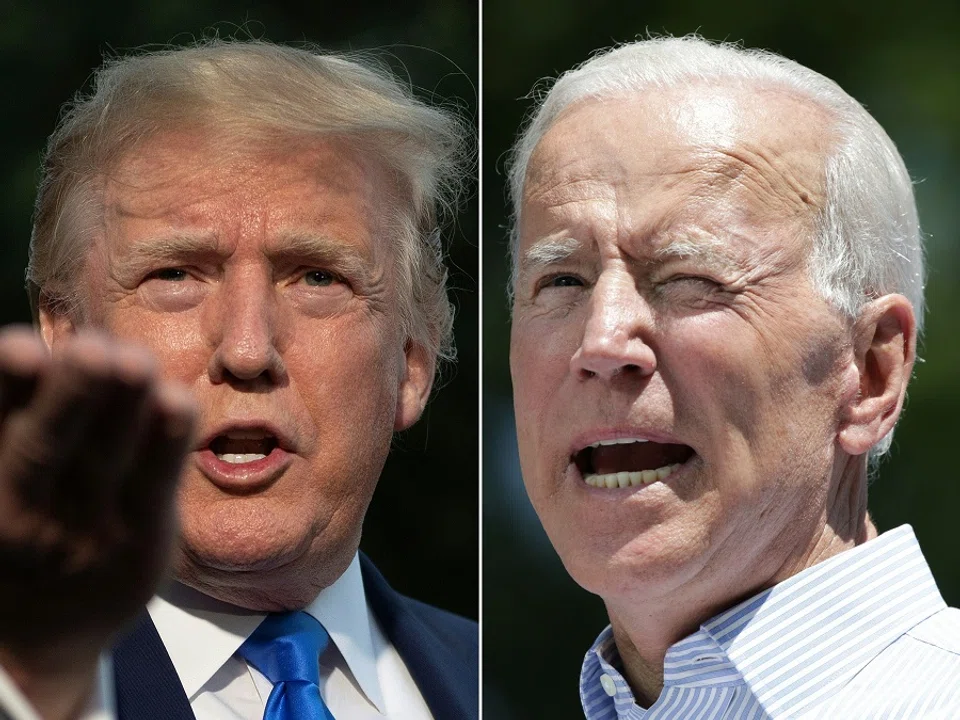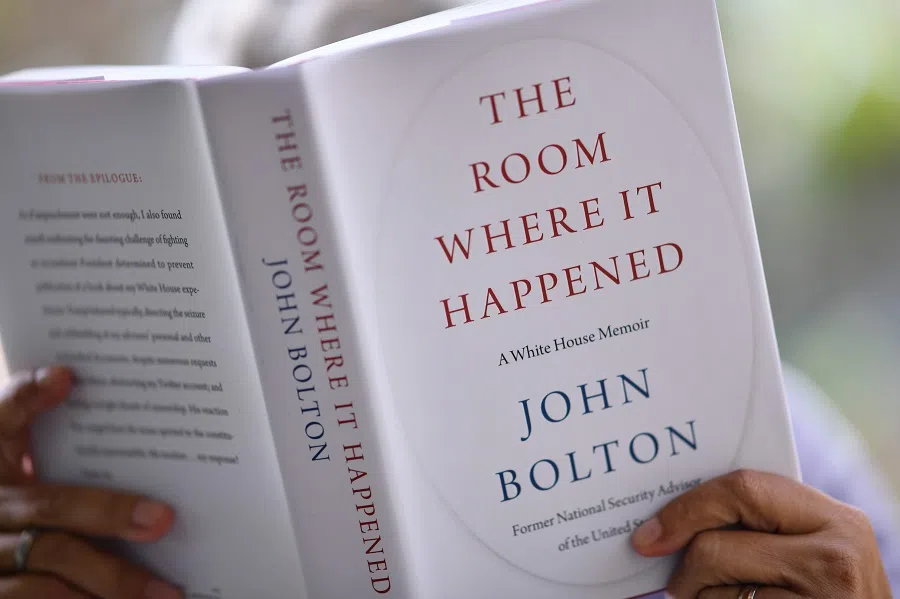Will the US abandon Taiwan?
Academics Zhou Wenxing and Wang Weinan observe the hard truth that Taiwan is often used as a strategic card to be played in the US's relationship with China. While Biden seems to be the safer pair of hands on Taiwan policy, if Trump gets re-elected, Taiwan may be entering a game of high risk but high returns. Either way, Taiwan will have to watch for which way the political vane turns, as the winds moving them are rarely in their control.

In his recently-released bombshell book, The Room Where It Happened: A White House Memoir, former US national security adviser John Bolton suggested that Taiwan is high on the list of those President Trump might abandon next, following his abandonment of the US's Kurdish allies in Syria. Besides, the possibility of the US ditching Taiwan is always there as long as Trump is president.
Looking back in history, the US has abandoned Taiwan several times.
Bolton's predictions sparked fear in Taiwanese people and triggered policy debates among political parties. Lin Wei-chou, the Kuomintang caucus whip, for example, criticised the ruling independence-leaning Democratic Progressive Party (DPP) for not pursuing a balanced policy toward the Chinese mainland and the US, thereby undermining Taiwan's interest. Lin's fears are not groundless. Taipei would have to pay a heavy price for its overdependence on Washington.

Looking back in history, the US has abandoned Taiwan several times. Taiwan's honeymoon period with Washington started when the Korean War broke out, but ended in the early 1970s when President Richard Nixon planned to collaborate with Beijing to deter the Soviet threat. President Jimmy Carter's decision to switch diplomatic recognition to Beijing in 1979 was a formal abandonment of Taipei, although the Taiwan Relations Act that the Carter administration initiated has maintained Washington's substantial unofficial relations with Taipei ever since.
Broadly speaking, when China-US relations are developing well, the US's Taiwan policy is more likely to be favourable to Beijing and Taiwan is more likely to be viewed as a strategic liability; when US-China ties deteriorate, the strategic card of Taiwan is more likely to be played against China.
Taiwan used as a strategic card against Beijing
It is interesting to observe the trajectory of policy discussions in Washington on "abandoning Taiwan" in the years between 2009-2014. China's rapid rise in the past decades increased America's hopes of cooperating with China in areas such as fighting terrorism, promoting economic development, and dealing with climate change. On the Taiwan issue, both China and the US had tempered former Taiwan President Chen Shui-bian's radical independence impulses. Cross-strait ties were also developing peacefully and stably after the mainland-friendly Ma Ying-jeou of KMT came to power in May 2008 after Chen. Against this backdrop, the US policy community began to discuss the possibility of ditching Taiwan. As China-US relations soured after 2014 in the latter part of President Barack Obama's presidency, however, voices calling for abandoning Taiwan faded away.
By reflecting on the triangular relations among Beijing, Taipei and Washington, we can conclude that Taiwan remains merely a strategic card to be played by the US, and whether, when and how it is played largely depends on the state of China-US relations. Broadly speaking, when China-US relations are developing well, the US's Taiwan policy is more likely to be favourable to Beijing and Taiwan is more likely to be viewed as a strategic liability; when US-China ties deteriorate, the strategic card of Taiwan is more likely to be played against China.
The Trump administration has been edging the US towards greater strategic competition with China since 2017. The Taiwan card has thus become more relevant to the US strategic elites once again - moves such as increasing the frequency and amount of US arms sales to Taiwan, increasing the number and diversity of Taiwan-related bills in Congress, and emphasising Taiwan's strategic importance in US Asia-Pacific strategy have all proceeded at a pace rarely seen since 1979.

The outbreak of the Covid-19 pandemic has undoubtedly further intensified US-China competition, and swept Taiwan up in the political maelstrom between the two powers vis-à-vis the World Health Organization. The different and even opposing policy options that Joe Biden and Donald Trump, the two candidates for the 2020 US presidential election, may endorse, however, bring more uncertainty to the US's Taiwan policy in the post-pandemic world.
Taiwan policy under Biden - low risk but stable returns
A longtime member and eventually chairman of the Senate Foreign Relations Committee, Democrat Joe Biden knows clearly the sensitivity of the Taiwan issue to US-China relations. Writing in the Washington Post in 2001 about then-President George W. Bush's flip-flopping stance on Taiwan, he reminded readers that the US had previously pursued a policy of "strategic ambiguity" where "we reserved the right to use force to defend Taiwan but kept mum about the circumstances in which we might, or might not, intervene in a war across the Taiwan Strait". Notably, he voted for the Taiwan Relations Act which was passed into law in 1979 but against the Taiwan Security Enhancement Act proposed in 1999 that might have altered the balance across the Strait. For Biden, "strategic ambiguity" maximises Washington's latitude to protect American interests in the Taiwan Strait.
If Trump gets re-elected, it should be noted that he does not have a clear strategy nor consistent policy on the Taiwan issue.
That said, Biden is still very likely to play the Taiwan card should he win the election. As China-bashing achieves greater bipartisan consensus in Washington, Biden may face more pressure to strengthen America's ties with Taiwan. Berating President Trump for abandoning US allies and partners, Biden writes in the March/April 2020 issue of Foreign Affairs that he will "build a united front of US allies and partners to confront China's abusive behaviours and human rights violations", from which can be inferred the importance of an ally such as Taiwan in this united front. But his deep knowledge of foreign policy and strong preference for the status quo in the Taiwan Strait, on the other hand, indicate that the US will play the Taiwan card without breaking the de jure one-China policy adhered to by previous administrations since Nixon. A stronger relationship with Taipei should be expected nonetheless.
Taiwan policy under Trump - high risk but high returns
If Trump gets re-elected, it should be noted that he does not have a clear strategy nor consistent policy on the Taiwan issue. Being "particularly dyspeptic" about Taiwan, according to Bolton in his book, Trump might forsake Taiwan if re-elected. But Trump needs to overcome two main barriers should he do so. Firstly, Republicans have a deep-rooted preference for substantially enhancing relations with Taiwan. The resurgent Taiwan lobby reinforces Republicans' commitments to Taiwan.
Secondly, Trump as a business-minded president recognises Taiwan's value in creating jobs and bringing money to the US. Bolton documents that Trump's decisions on military sales to Taiwan are either out of considerations to do with money and jobs, or if he happens to be persuaded by his advisers. The newly approved package of arms sales to Taiwan in July is just another good case in point. Given Trump's reluctance to listen to experts and his advisers, we should not rule out the possibility that Taiwan may turn out to be a victim to be abandoned, although the possibility remains less likely.

However, we should also note that Trump's indifference to Taiwan would leave more space for Congress and particularly Republican lawmakers to interfere in China's domestic affairs. The legislative branch has introduced more than 50 bills and resolutions in the past three and half years, in which six have been signed by Trump into laws.
For example, the Taiwan Travel Act permits high-level officials to visit Taiwan and vice versa and the Taiwan Allies International Protection and Enhancement Initiative (TAIPEI) Act of 2019 requires the executive branch to help strengthen Taiwan's "diplomatic relationships" around the world. The recently proposed Taiwan Defence Act suggests maintaining the ability of the US Armed Forces to deny a fait accompli by China, further strengthening the so-called US-Taiwan defence partnership while decreasing US strategic ambiguity in the Strait.
Given the above conditions, the possibility of establishing "diplomatic relations" with Taiwan exists in the case of Trump's second term of presidency.
As one of the few flashpoints that may draw the two powers into a war that neither wants, Taiwan carries more weight in the post-pandemic era when the US is poised to compete more fiercely with China. On the Taiwan issue, Biden's policy is more rational and predictable while Trump's approach is just the other way around. Metaphorically speaking, Trump is more like a high-risk stock with high returns while Biden is a low-risk stock with stable returns to Taiwan. All stakeholders must navigate cautiously through the uncharted waters in the Taiwan Strait as the 2020 election nears.






